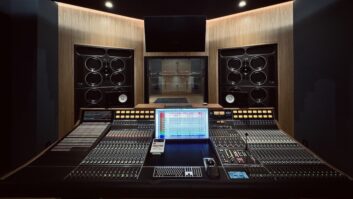CHANGES IN INDUSTRY AND BUSINESS MODELS SET THE TONE FOR STUDIO MANAGERS
The job of a studio manager has been much maligned, rarely understood, almost always underpaid, and very often a last resort for those who failed to get by in production and engineering. However, as the music recording industry morphs into a model that more closely resembles General Motors than a Bon Jovi tour, the studio manager is looked at as being key to a facility’s profitability and success.
Still, old perceptions die hard. The position still lacks the kind of respect it deserves, and finding and developing people with both management talent and an intimate understanding of the ways of the studio business is difficult. At a time when many high-end music recording facilities are growing larger and more complex and expanding into other locations, it’s possible that future generations of the management infrastructure will be drawn from business schools rather than from the trenches of pro audio.
THE OLD DAYS ARE OVER
“The days of having a manager who just hangs out near the phone and books the studio when people call in are over,” says Dale Moore, owner of Emerald Entertainment in Nashville. Via acquisitions and joint ventures, Emerald has grown from a two-room facility to seven studios and a broadcast suite spread over four buildings along Nashville’s Music Row. Although the local economics of Nashville’s studio community had much to do with Emerald’s rapid expansion, the overarching propulsion comes from larger forces in the media industry, most notably the consolidation of dozens of record labels into a handful of budget-conscious, super-content providers. Studios such as Emerald; The Hit Factory in New York, which bought and refurbished Criteria Studios in Miami; and Quad Recording, also in New York, which added a Nashville facility a year ago, have reacted to this trend by consolidating operations and expanding services. The paradigm is more akin to Home Depot, not the cottage industry-like approach that music studios had historically taken. More complex operations need more astute management.
That’s one of the biggest problems with studio management—managers wind up being the chew toy in the middle between studio owners on one side, and engineers and clients on the other.
—Doug Mitchell
“In many ways, I’m finding that we almost would rather not have someone who has been in the [studio] industry,” says Moore. “When you bring in someone who has worked in studio management in the past under the old way of running studios, it’s harder for them to adapt to the new way it’s being done.”
Emerald’s growth has led to a divisional break in the business, including music recording, mastering, audio post-production and broadcast. At Emerald, each division has its own manager, each of whom hires a dedicated management staff and reports to Andrew Kautz, Emerald Entertainment’s COO, a position that was established in the past 18 months. “The people you need to run organizations like this in the studio business are a whole new breed,” says Moore. “They don’t learn the skills they need in the traditional studio business. That’s why it’s often better to train them yourself in management. You’re better off building them from a kit in the basement.”
Studio managers are not acquiring these levels of management skills at media educational facilities, either. Most programs have not made academic accommodation for management skills; few tend to underplay it, realizing that studio management is not a major draw for prospective tuition-paying students with hopes of becoming engineers, mixers and producers.
“Admittedly, it’s not a sexy subject,” concedes Doug Mitchell, associate professor at MTSU’s Recording Industry Management (RIM) program, which is attended by 1,400 students. MTSU offers a Studio Administration course, but it’s an elective and designed to provide a range of entrepreneurial skills to students, many of whom will go directly into personal recording environments after graduation, rarely setting a W-2 foot in conventional studios. “It’s more for teaching them how to start and run their own [studio] business,” says Mitchell. “It doesn’t teach what someone needs to know about running a very complex, large facility, or about the kinds of personal management skills you need when you’re dealing with a lot of very creative people in a business setting. That’s one of the biggest problems with studio management—managers wind up being the chew toy in the middle between studio owners on one side, and engineers and clients on the other.”
“On one hand, you’re responsible for making sure the facility runs smoothly as a business and plotting strategies to keep the studio on top, from console choices to single microphone purchases,” adds Michelle Moore, manager at the new Studio Atlantis. “On the other hand, you’re lining up dry cleaning and finding massage therapists who are willing to come to the studio when a client wants one. This is what a concierge does at a hotel, but even the concierge isn’t also responsible for booking the rooms, too.”
Moore, who over the past decade has managed several Los Angeles facilities, including Ground Control, Studio 56, Studio 55 and Private Island Trax, came into studio management after a shot at engineering. She received a degree from the Trebas Institute in 1991 and, like many others, found that studio management turned out to be just as challenging and more reliable than a freelance engineering career.
In fact, because of changes in the fundamental landscape of the music business, the challenges may be even greater. Brett Blanden, who managed Ocean Way Nashville for a year and a half until departing in October 1999 to open his own studio, observes that, “The competition used to be the studio next door. Now it’s the demo studio on the other side of town, which can rent a 2-inch tape machine for what a studio like Ocean Way pays in electricity for a day, or the producer who used to be a client. Labels are now encouraging artists and producers to use their own studios. A manager is someone who works to market and position a facility to counter those kinds of forces. That is not an easy job, and it’s not one that managers had to face a decade ago.”
The studio management career track has created its own handful of superstars, such as Blanden, Moore, Record Plant’s Rose Mann-Cherney (now president of that facility), former Power Station/Avatar manager Zoe Thrall, and a few others, though you’d be hard-pressed to find them on the covers of trade publications, which remain as shrines to engineers and producers. But, thanks to them and others, the perception of the studio manager role is changing.
NOT THE BIG BUCKS YET
“I’ve noticed a major increase in awareness of the value of a studio manager at top-flight facilities,” says Claudia Lagan, former manager at Studio 56 and now manager of CMS Mastering Services in the Los Angeles area. “The ones I know in the industry are being treated better. There is a willingness to increase their compensation, both in terms of salaries and benefits, such as retirement plans, vacations, personal days and medical coverage. This is a noticeable change from even 10 years ago, and I attribute it to the fact that there are a few very good ones out there, and when they leave a facility, you notice it.”
The trouble is, Lagan says, most managers have to prove their worth over time. Achievements at previous positions rarely count for much in terms of compensation, at least initially. Only those who have been headhunted for their positions have any real leverage for compensation and other employment perks. “The sad truth of the matter is that [studio] management still tends to attract people who have failed at other aspects of the industry,” Lagan observes. “And that works against you every time you take on a new position.”
The ongoing expansion into the upper tiers of the music recording market will eventually make its facilities look and feel a lot like large audio post-production facilities. Hank Neuberger, general manager and executive VP at Chicago Recording Co., where he oversees a dozen studios, thinks that the post management model might also work for large music facilities. “[Post facilities] depend on management staff a lot more, because they have to hand off projects between so many different rooms all day long,” he explains. “Managing a music facility could be headed that way, as well, and that really puts a new emphasis on management.”
Studio management is still not a very lucrative pursuit, although it indicates that compensation is on the upswing. According to 2-year-old data from the Mixonline Audio Production Facilities Report, the most recent figures available, facility managers reported a median salary of $30,000 per year and an average salary of $42,500. More recently, and admittedly anecdotal, reports indicate that salaries in the Los Angeles and New York City markets at top-end music studios are currently closer to between $50,000 and $60,000, with a few approaching $75,000. Nashville, where the cost of living is considerably lower, is in the $30,000 to $40,000 range at high-end studios.
Actual compensation is difficult to assess, because many facilities put managers on a combination of base salary and bonus/performance. Such a mixture tends to shift the emphasis of the manager toward direct sales of studio rental time and other immediate revenue/commission generators, as opposed to long-term strategic pursuits, such as marketing and public relations. From the studio owner’s perspective, though, this makes perfect sense, because it allows management salaries to ride with the revenue waves and limits overhead liability during troughs in the business cycle.
Managers also say that studio owners need to start appreciating just how difficult the management role has become. Most managers seem less concerned about a few thousand extra dollars a year in salary than they are about being given the freedom they need to get their job done.
“There’s the sense [by owners] that you’re always supposed to be out getting bookings for the studio, even while you’re trying to manage all the other aspects of the facility,” says Blanden. “I kept a three-ring notebook filled with every phone conversation I had there for two years so I could show what it was I had to do besides try to bring in new business. Also, owners are concerned with how much a manager gets to know about company secrets and about other studios stealing gigs from you. The reality is, a good manager is always in contact with other studios and always juggling clients between his place and other studios. You have to do that to keep the client happy, and that’s the bottom line to make any studio successful. No one studio can give every client everything he wants all the time. But given the right resources and freedom to act, a good studio manager can.”
Zoe Thrall agrees vociferously. “The best thing a studio manager can have is a [studio] owner who understands everything that a manager has to accomplish and what they need to do it,” she says. “There’s definitely a kind of a Mars/Venus thing when it comes to communication between ownership and management.”
The most telling irony of all is how much the words of these interviewed studio managers sound like as if they have fallen out of the pages of Business Week or Forbes. The need for company management to adapt to changes in technology and business models, to deal with changes in how clients operate, what the economic realities of a given industry are, for company ownership to support management and recognize that it needs to work hand in hand with it are common themes in every industry today. If anything comes out of the dialog stirred up by the alternating forces of consolidation and expansion in the upper echelons of the studio business, say managers, then it’s the stark realization that recording music and running a recording studio is first and foremost a business venture, not an artistic one. And studio managers have been on the front lines of that battle for a long, long time.
Dan Daley is Mix’s East Coast editor.







